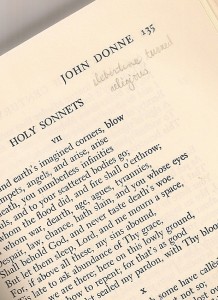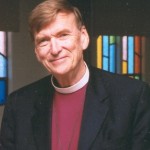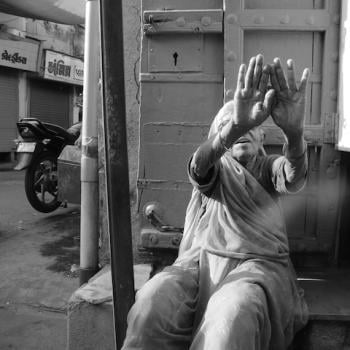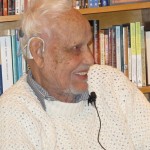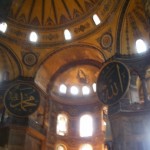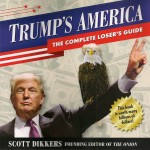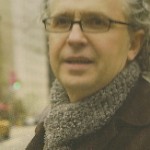I was a junior in college and I was smitten. Who was the lucky guy? An Englishman four hundred years dead — John Donne, poet, priest and founder of the Metaphysical Poets, a group that included poets like George Herbert and Andrew Marvell
Donne was a “libertine turned religious,” according to the comments I made in the margins of my textbook that year as an English major at the University of Michigan.
My notes were cautious and cerebral — something I could later safely put into a term paper for all to read. My feelings were not so circumspect. For me, as a twenty-year-old, Donne’s poems fairly burst with yearning, both spiritual and erotic.
This poem, one of Donne’s “Holy Sonnets,” was my favorite:
Batter my heart, three personed God; for you
As yet but knock, breathe, shine, and seek to mend;
That I may rise and stand, o’erthrow me and bend
Your force to break, blow, burn and make me new.
I, like an usurped town, to another due,
Labour to admit you, but Oh, to no end;
Reason, your viceroy in me, me should defend,
But is captived and proves weak or untrue.
Yet dearly I love you and would be loved fain,
But am betrothed unto your enemy:
Divorce me, untie or break that knot again,
Take me to you, imprison me, for I
Except you enthrall me, never shall be free,
Nor ever chaste, except you ravish me.
Whew!
Two years later, I graduated from college and eventually took up writing and reading journalism. Nothing steamy. No John Donne. Mostly stuff that I could clip from the newspaper and send home to my mother. I forgot all about John Donne . . . Until a few years ago, when I attended John Adam’s opera, “Doctor Atomic,” during its 2005 premiere season.
It turned out that both John Adams, the composer, and Robert Oppenheimer, the theoretical physicist who became known as the father of the atomic bomb, shared my enthusiasm for Donne. Adams set the poem to music for “Doctor Atomic.” He put the words in Oppenheimer’s mouth as the physicist anguishes over the enormity of the bomb he is building.
Follow this link to Adam’s rendering of “Batter My Heart” to hear a seventeenth century metaphysical poet explode into the twenty-first century.
This piece appeared originally on BarbaraFalconerNewhall.com, where Barbara riffs on her rocky spiritual journey and the view from the second half of life. If you enjoyed this post, you might like “Jane Johnson Schoolcraft — A Native Voice Recovered.” Also, “Religion Scholar Huston Smith Sums It Up — Be Happy!”

